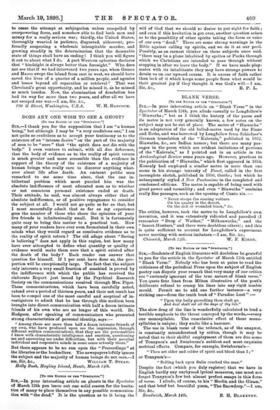DOES ANY ONE WISH TO SEE A GHOST
[TO THE EDITOR Or THE "SPECTATOR."]
thank you for the supposition that I am "a human being," but although I may be "a very credulous one," I am not quite so credulous as to accept your testimony as to the existence of an "intense desire" on the part of the majority of men to be " sure " that "the spirit does not die with the body." I even venture to submit, with all due deference, that the body of evidence as to the reality of spirit return is much greater and more accessible than the evidence in support of the theory of the existence of a majority of human beings who really care to discover anything what- ever about life after death. An eminent public man remarked to me some time since, that the one in- tellectual problem which most puzzled him was the absolute indifference of most educated men as to whether or not conscious personal existence ended at death. Their attitude, he said, was almost always either that of
absolute indifference, or of positive repugnance to consider the subject at all. I would not go quite so far as that, but I must mournfully admit that so far as my experience
goes the number of those who share the opinions of your five friends is infinitesimally small. But it is fortunately quite easy to bring this matter to a practical test. How many of your readers have ever even formulated in their own minds what they would regard as conclusive evidence as to the reality of spirit return ? The old adage about "Seeing is believing" does not apply in this region, but how many have ever attempted to define what quantity or quality of evidence would make them sure that a spirit existed after the death of the body ? Each reader can answer that question for himself. If 1 per cent. have done so, the pro- portion will be exceptionally large. The fact that the subject only interests a very small fraction of mankind is proved by the indifference with which the public has received the elaborate Report just issued by the Psychical Research Society on the communications received through Mrs. Piper. These communications, which have been carefully noted, extend over a period of thirteen years, and their net result has been to compel one of the most careful and sceptical of in- vestigators to admit that he has through this medium been brought into direct communication with half a dozen intimate friends of his own who are no longer of this world. Dr. Hodgson, after speaking of communicators who presented strong characteristics of personal identity, says:—
" Among these are more than half a dozen intimate friends of my own, who have produced upon me the impression, through different written communications, that they are the personalities I knew with characteristic intelligence and emotion, questioning me and answering me under difficulties, but with their peculiar individual and responsive minds in some sense actually there."
But there appears to be no ran upon the "Proceedings" at the libraries or the booksellers. The newspapers loftily ignore the subject and the majority of human beings do not care.—I
am, Sir, &c., WILLIAM T. STEAD.
Holly Bush, Hayling Island, Hants, March 14th.
[To THE EDITOR Or THE " SPECTATOR:1
Bra,—In your interesting article on ghosts in the Spectator of March 12th you leave out one solid reason for the hesita- tion of many to place themselves in any possible communica- tion with "the dead." It is the question as to it being the will of God that we should so desire to put sight for faith ; and even if this hesitation is got over, another question arises as to the possibility of other spirits taking the form or voice of our own "dead." There are some strong warnings in the Bible against calling up spirits, and we do it at our peril. Possibly, as an earnest thinker on these subjects once said. "there may be a plane inhabited by sprites or Packs through which we Christians are intended to pass through without stopping in after we leave the body." If we have made play- mates with its inhabitants they may have strange powers to detain us on our upward course. It is excess of faith rather than lack of it which keeps some people from what would be their greatest joy if they thought it was God's will.—I am,
Sir, &c., B. P. L.






































 Previous page
Previous page